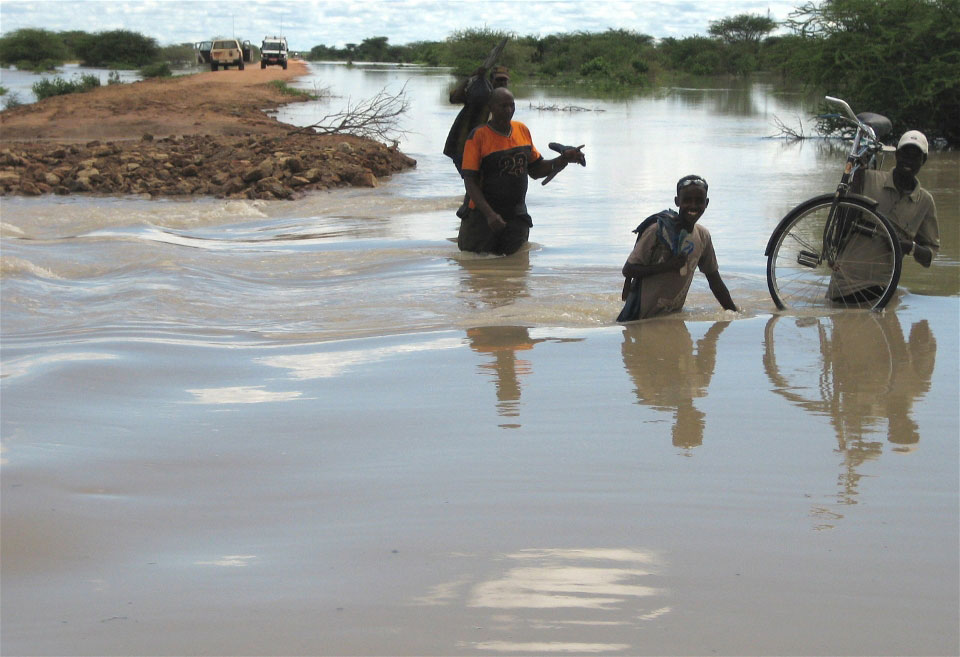Thousands affected by tropical storms in Mozambique.
Thousands affected by tropical storms in Mozambique – UN humanitarian arm
 Thousands affected by tropical storms in Mozambique.
Thousands affected by tropical storms in Mozambique.
31 January 2012 – The United Nations humanitarian agency reported today that an estimated 117,000 people have been affected by two tropical storms in Mozambique last week, adding that it is closely monitoring the situation.
According to Government reports, 40 people have been killed so far by the heavy rains, and numbers expected to climb following ongoing assessments of the situation.
According to the Office for the Coordination of Humanitarian Affairs (OCHA), the biggest priority is to provide shelter and 16,000 survival kits for those whose houses have been destroyed, as the rains have also destroyed designated community shelters such as schools and churches.
OCHA stated that damage assessments continue throughout the country, and warned that internal country resources may not be enough to respond to emerging needs.
###
About the United Nations Office for the Coordination of Humanitarian Affairs (OCHA)
OCHA is the part of the United Nations Secretariat responsible for bringing together humanitarian actors to ensure a coherent response to emergencies. OCHA also ensures there is a framework within which each actor can contribute to the overall response effort.
OCHA’s mission is to:
- Mobilize and coordinate effective and principled humanitarian action in partnership with national and international actors in order to alleviate human suffering in disasters and emergencies.
- Advocate the rights of people in need.
- Promote preparedness and prevention.
- Facilitate sustainable solutions.
How we deliver
OCHA’s Strategic Framework ensures that OCHA delivers on its core mandate, while responding to contemporary global challenges. The three pillars of the Strategic Framework are:
1. Partnerships: broadening the coalition for multilateral humanitarian action
The scale and scope of global challenges requires working together in new ways, with new partners. Partnership has always been integral to OCHA’s efforts. Sustained relations, built on trust and mutual respect, are vital when preparing for and responding to humanitarian emergencies. OCHA has a unique position within the international humanitarian system to convene and influence agendas. We will do this more strategically, with the aim of creating a more enabling environment for humanitarian action.
2. Service provider: building a better system
The expectations of OCHA have evolved since humanitarian reform. We will ensure that our services and support to partners also evolve and meet clients’ needs. We are focused on helping partners more predictably through humanitarian coordination leadership, strengthening coordination mechanisms, and improving the evidence base for humanitarian decision-making, planning and resource allocation.
3. Reliability and professionalism: creating better staffing and surge solutions to be there when it counts
In 2010, OCHA will introduce surge solutions to ensure the right people are on the ground immediately after a new disaster. This will be coordinated with longer-term staffing to ensure continuity of OCHA presence.
OCHA people
OCHA is its people. From 35 offices around the world, some 1,900 specialized and dedicated OCHA staff work to ensure that effective assistance reaches millions of humanitarian beneficiaries in four continents.

###
> United Nations (UN).
 The United Nations was established on 24 October 1945 by 51 countries committed to preserving peace through international cooperation and collective security. Today, nearly every nation in the world belongs to the UN: membership totals 192 countries.
The United Nations was established on 24 October 1945 by 51 countries committed to preserving peace through international cooperation and collective security. Today, nearly every nation in the world belongs to the UN: membership totals 192 countries.
When States become Members of the United Nations, they agree to accept the obligations of the UN Charter, an international treaty that sets out basic principles of international relations. According to the Charter, the UN has four purposes:
- to maintain international peace and security;
- to develop friendly relations among nations;
- to cooperate in solving international problems and in promoting respect for human rights;
- and to be a centre for harmonizing the actions of nations.
###
* The above story is adapted from materials provided by United Nations (UN)
** More information at United Nations (UN)


















